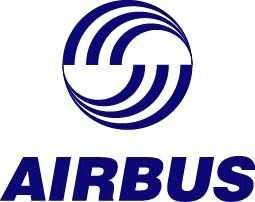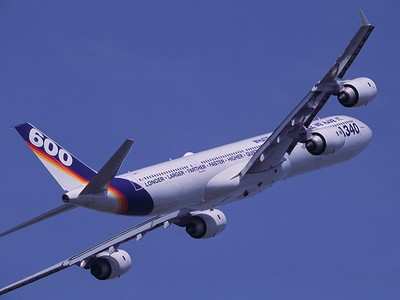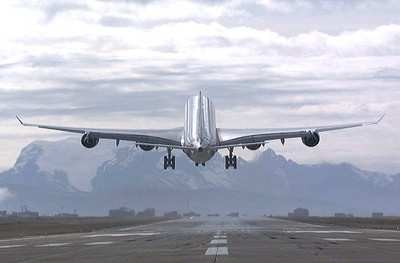Sun, Apr 20, 2008
'World's First Trial' Of A New Flight Procedure Reduces Fuel
Burn And Emissions During Cruise
 The partners of an Airbus-led
project called CRISTAL ITP (In-trail Procedure) successfully
carried out the world's first in-flight demonstration of a flexible
new procedure for oceanic airspace that saves fuel and reduces
emissions during cruise. The new in-trail procedure will enable
aircraft to more easily perform altitude changes during cruise
which can significantly improve flight efficiency, reducing fuel
burn and emissions. When an aircraft is not at its optimal
altitude, aircraft fuel consumption and emissions are increased. As
fuel is burned, the aircraft weight is reduced, and the aircraft
then needs to climb to maintain its optimum cruise efficiency.
Additionally, favourable winds can be found at higher or lower
altitudes.
The partners of an Airbus-led
project called CRISTAL ITP (In-trail Procedure) successfully
carried out the world's first in-flight demonstration of a flexible
new procedure for oceanic airspace that saves fuel and reduces
emissions during cruise. The new in-trail procedure will enable
aircraft to more easily perform altitude changes during cruise
which can significantly improve flight efficiency, reducing fuel
burn and emissions. When an aircraft is not at its optimal
altitude, aircraft fuel consumption and emissions are increased. As
fuel is burned, the aircraft weight is reduced, and the aircraft
then needs to climb to maintain its optimum cruise efficiency.
Additionally, favourable winds can be found at higher or lower
altitudes.
The demonstration flight took place in late March using Airbus'
own A340 test aircraft and an SAS A330, performing the trial in
Icelandic airspace. Iceland is a unique location where oceanic
operations are carried out within radar coverage thus ensuring the
complete safety of the trial.
During the test, the A340 performed several altitude changes
relative to the SAS A330 using a new aircraft system fitted on the
A340 and including an Aviation Communication & Surveillance
Systems (ACSS) Traffic Computer. Using this system the pilot was
able to receive on his navigation display all the flight
identification and positioning information regarding the
surrounding aircraft. This new system, based on ADS-B (Automatic
Dependant Surveillance - Broadcast), a new air-to-ground and
air-to-air surveillance technology used to transmit aircraft
information, is currently being certified by Airbus.
This new demonstration is a significant step towards more
flexible operations in an oceanic environment, enabled by new
aircraft technologies and more efficient pilot-controller
collaboration. Currently these kinds of maneuvers are rarely
possible in oceanic airspace due to the lack of radar systems. With
the new technology, the flight crew can provide the controller with
accurate information about their position relative to other
aircraft. With the In Trail Procedure, the controller will use this
information to allow altitude changes with reduced separations,
providing more climbing opportunities.

The partners involved in the CRISTAL ITP trial are ISAVIA (the
air traffic control provider in Iceland), NATS (the air traffic
control provider in the UK), EUROCONTROL CASCADE programme, Airbus
and SAS.

The results of these trials will further strengthen Airbus'
experience in this field as well as benefit other European projects
Airbus is supporting that aim to reduce fuel burn and emissions
such as the Atlantic Interoperability initiative to Reduce
Emissions (AIRE), a joint initiative between the European
Commission and the US Federal Aviation Administration.
More News
Aero Linx: International Federation of Airworthiness (IFA) We aim to be the most internationally respected independent authority on the subject of Airworthiness. IFA uniquely combi>[...]
Ultrahigh Frequency (UHF) The frequency band between 300 and 3,000 MHz. The bank of radio frequencies used for military air/ground voice communications. In some instances this may >[...]
A Few Questions AND Answers To Help You Get MORE Out of ANN! 1) I forgot my password. How do I find it? 1) Easy... click here and give us your e-mail address--we'll send it to you >[...]
From 2019 (YouTube Edition): Learning To Paint Without Getting Any On Your Hands PPG's Aerospace Coatings Academy is a tool designed to teach everything one needs to know about all>[...]
Also: Sustainable Aircraft Test Put Aside, More Falcon 9 Ops, Wyoming ANG Rescue, Oreo Cookie Into Orbit Joby Aviation has reason to celebrate, recently completing its first full t>[...]
 ANN's Daily Aero-Linx (05.06.25)
ANN's Daily Aero-Linx (05.06.25) ANN's Daily Aero-Term (05.06.25): Ultrahigh Frequency (UHF)
ANN's Daily Aero-Term (05.06.25): Ultrahigh Frequency (UHF) ANN FAQ: Q&A 101
ANN FAQ: Q&A 101 Classic Aero-TV: Virtual Reality Painting--PPG Leverages Technology for Training
Classic Aero-TV: Virtual Reality Painting--PPG Leverages Technology for Training Airborne 05.02.25: Joby Crewed Milestone, Diamond Club, Canadian Pilot Insurance
Airborne 05.02.25: Joby Crewed Milestone, Diamond Club, Canadian Pilot Insurance





